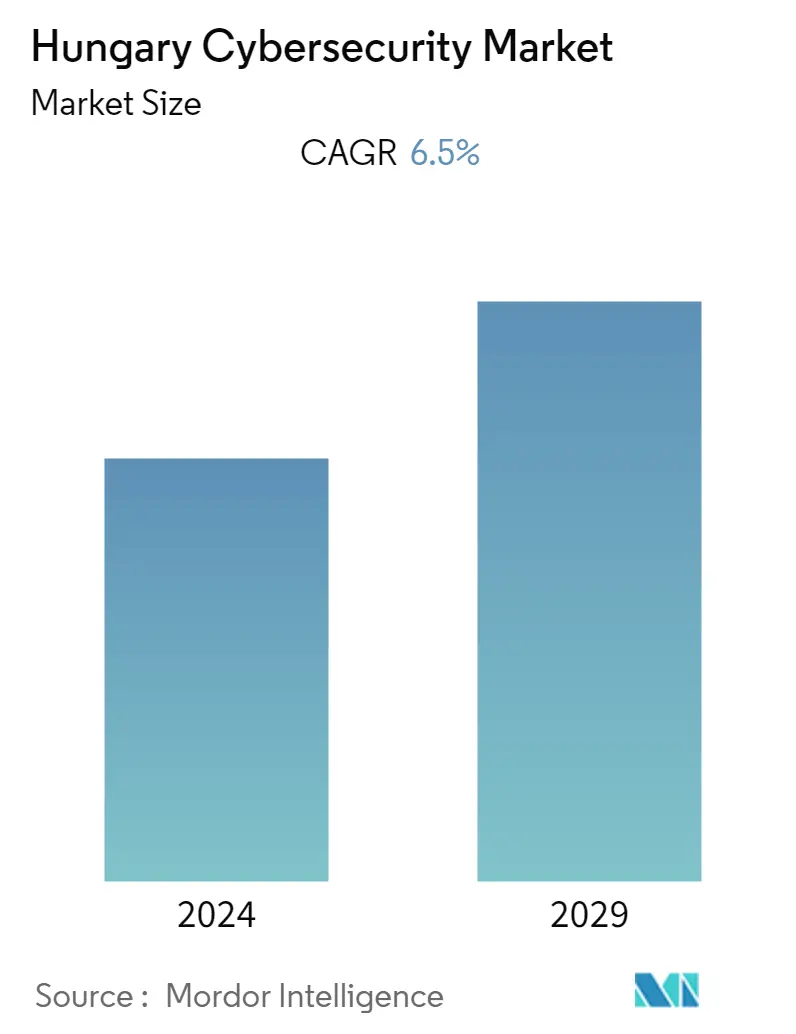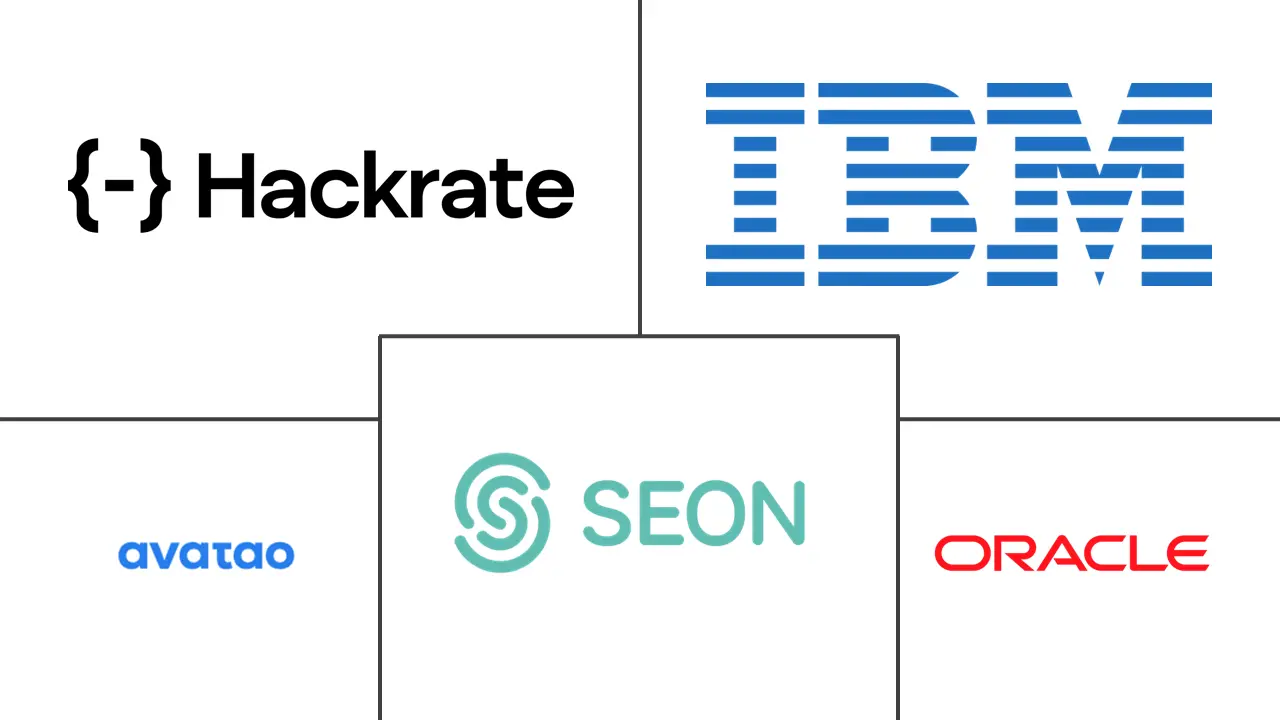Market Size of Hungary Cybersecurity Industry

| Study Period | 2019 - 2029 |
| Base Year For Estimation | 2023 |
| Forecast Data Period | 2024 - 2029 |
| Historical Data Period | 2019 - 2022 |
| CAGR | 6.50 % |
| Market Concentration | Medium |
Major Players
*Disclaimer: Major Players sorted in no particular order |
Hungary Cybersecurity Market Analysis
The Hungary Cybersecurity Market is anticipated to grow with a CAGR of 6.5% during the forecast period. Ransomware and DDoS attacks are expected to increase further during the forecast period and even more targeted against large organizations in regions where the adoption rate for cybersecurity solutions is not as high. Also, ransomware-as-a-service offerings and their construction kits have been estimated to fuel this increase, particularly as an easy tool for novice or low-skilled criminals.
- The national and international contexts of cybersecurity have undergone significant changes due to the emergence of cyberspace, a new medium that has become a key factor in the 21st century. The Hungarian cybersecurity strategy aims at developing free and secure cyberspace and protecting national sovereignty. Additionally, it strives to safeguard the operations of the national economy and society, adapts technological advancements safely to promote economic growth, and establishes global collaboration in this area in line with Hungary's national interests. To create a proper strategic framework for domestic collaboration and coordination as well as for international cooperation, both texts were written with consideration for international examples, the significance of international involvement, and trends and problems.
- The most frequent target in the corporate-institutional area, according to the most recent MS Digital Defense Report, is retail (13%), which is followed by the financial services sector (12%), manufacturing (12%), government administration (11%), and healthcare (9%). The Cyber Threat Resilience Team, run by T-Systems, a division of Magyar Telekom, has noted similar trends. Every day, the CTRL evaluates and looks into hundreds of possible IT incidents. In addition, it discovers tens of real occurrences that are reported to the parties concerned and thoroughly investigated. The CTRL has found that the relative isolation and the difficulty of the Hungarian language are no longer a barrier because criminals now employ linguistically skilled people to carry out the necessary background checks.
- The majority of firms are vulnerable to DDoS assaults due to the dramatic increase in bandwidth use. According to Accenture, organizations that previously had over-provisioned bandwidth to deal with potential DDoS attacks have begun to use it for remote employees. This has led to decreases in bandwidth available to defend against DDoS attacks. With most of the workforce telecommuting, DDoS attacks have a strong potential to cause operational downtime issues for organizations.
- Hungary, businesses rely on a wide range of experts to protect their systems, personnel, and data. Since cyber threats are growing more quickly than ever before, businesses all over the world are battling to locate qualified individuals who can assist them mitigate these risks. For companies of all sizes and sectors, a cybersecurity workforce shortage continues to be a challenge. Today's cybersecurity positions are multi-faceted and increasingly diverse across specializations, companies, and industries, which is highlighted by the growing need for a wider combination of technical and non-technical abilities.
Hungary Cybersecurity Industry Segmentation
Cybersecurity solutions enable an organization to monitor, detect, report, and counter cyber threats that are internet-based attempts to damage or disrupt information systems and hack critical information using spyware and malware, and phishing to maintain data confidentiality. The Hungary cybersecurity market is segmented by offering (security (cloud security, data security, identity access management, network security, consumer security, infrastructure protection) and services), deployment (cloud and on-premise), and end user (BFSI, healthcare, manufacturing, government and defense, and IT and telecommunication).
| By Offering | |||||||||
| |||||||||
| Services |
| By Deployment | |
| Cloud | |
| On-premise |
| By End User | |
| BFSI | |
| Healthcare | |
| Manufacturing | |
| Government & Defense | |
| IT and Telecommunication | |
| Other End Users |
Hungary Cybersecurity Market Size Summary
The Hungary cybersecurity market is poised for significant growth, driven by the increasing frequency of cyber threats such as ransomware and DDoS attacks, particularly targeting large organizations. The evolving landscape of cyberspace has prompted Hungary to develop a robust cybersecurity strategy aimed at safeguarding national sovereignty and promoting economic growth through technological advancements. This strategy emphasizes the importance of international collaboration and the adaptation of cybersecurity measures to protect critical sectors such as retail, financial services, manufacturing, government, and healthcare. The rise of Industry 4.0 has further exposed the manufacturing sector to cyber risks, necessitating a comprehensive approach to cybersecurity that integrates both IT and operational technologies.
The shift towards cloud-based solutions is reshaping the cybersecurity landscape in Hungary, with businesses increasingly recognizing the benefits of on-demand security services. This transition is facilitated by the growing adoption of cloud platforms, which offer scalability and cost-effectiveness. However, the expansion of cloud services also introduces new security challenges, prompting organizations to implement robust cybersecurity measures to protect sensitive data. The market is moderately consolidated, with major companies investing in strategic partnerships and product innovations to enhance their offerings. Recent developments, such as the EU Cyber Resilience Act and collaborations between global technology firms, underscore the dynamic nature of the cybersecurity market in Hungary, as it adapts to emerging threats and technological advancements.
Hungary Cybersecurity Market Size - Table of Contents
-
1. MARKET INSIGHTS
-
1.1 Market Overview
-
1.2 Value Chain Analysis
-
1.3 Porter's Five Forces Analysis
-
1.3.1 Threat of New Entrants
-
1.3.2 Bargaining Power of Buyers
-
1.3.3 Bargaining Power of Suppliers
-
1.3.4 Threat of Substitutes
-
1.3.5 Intensity of Competitive Rivalry
-
-
1.4 Impact of COVID-19 on the Market
-
-
2. MARKET SEGMENTATION
-
2.1 By Offering
-
2.1.1 Security
-
2.1.1.1 Cloud Security
-
2.1.1.2 Data Security
-
2.1.1.3 Identity Access Management
-
2.1.1.4 Network Security
-
2.1.1.5 Consumer Security
-
2.1.1.6 Infrastructure Protection
-
2.1.1.7 Other Security Types
-
-
2.1.2 Services
-
-
2.2 By Deployment
-
2.2.1 Cloud
-
2.2.2 On-premise
-
-
2.3 By End User
-
2.3.1 BFSI
-
2.3.2 Healthcare
-
2.3.3 Manufacturing
-
2.3.4 Government & Defense
-
2.3.5 IT and Telecommunication
-
2.3.6 Other End Users
-
-
Hungary Cybersecurity Market Size FAQs
What is the current Hungary Cybersecurity Market size?
The Hungary Cybersecurity Market is projected to register a CAGR of 6.5% during the forecast period (2024-2029)
Who are the key players in Hungary Cybersecurity Market?
Seon. fraud fighters, Hackrate, Avatao, IBM Corporation and Oracle Corporation are the major companies operating in the Hungary Cybersecurity Market.

